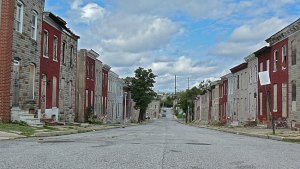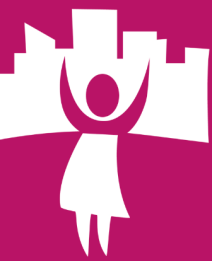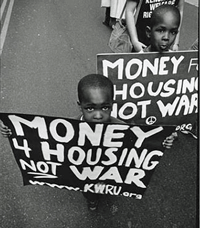The Julie Gold song “From a Distance” has long been a favorite of mine. And, as two strikingly different events converge this year – the 50th anniversary of President Lyndon B. Johnson’s “War on Poverty” and a rare meet-up in our own Milky Way galaxy of two unique, yet equally impressive entities, a spectacular gas cloud and an immense black hole with the mass of four million suns, Gold’s lyrics give us pause for thought:
From a distance/We all have enough/And no one is in need/And there are no guns, no bombs, and no disease/No hungry mouths to feed/From a distance/We are instruments/Marching in a common band/Playing songs of hope/Playing songs of peace/They are songs of every man/God is watching us/God is watching us/God is watching us/From a distance.
The universe is full of mystery; and, no one really knows what the outcome will be or what the event will ultimately mean for science and humankind when the gas cloud, called G2,  passes over the “event horizon” of the super-giant black hole that scientists have named Sagittarius A. The ominous-sounding “event horizon” is a phrase scientists use to describe the irrevocable point of no return on the rim of a black hole where the gravitational pull is so strong that nothing, not even a spark of light, has ever escaped. What will actually happen and what we might ultimately learn about our universe and ourselves in observing this extraordinary phenomenon are big open questions with potentially life-changing answers.
passes over the “event horizon” of the super-giant black hole that scientists have named Sagittarius A. The ominous-sounding “event horizon” is a phrase scientists use to describe the irrevocable point of no return on the rim of a black hole where the gravitational pull is so strong that nothing, not even a spark of light, has ever escaped. What will actually happen and what we might ultimately learn about our universe and ourselves in observing this extraordinary phenomenon are big open questions with potentially life-changing answers.
The universe is indeed full of mystery. But poverty should not be one of those mysteries. The lessons of the last 50 years, since the “War on Poverty” was declared, have taught us well about the struggles of people who need to decide from month to month whether they  can afford to eat or take their child to a doctor or have lights and heat in their houses. In Baltimore City, where Caroline Center is working to educate and train women for professional health care careers, the poverty statistics are dire and the economic realities are harsh. The city continues to struggle with an unemployment rate in the double digits – 10.1%. The growth in low-wage jobs continues to outperform middle- and high-wage job growth – low-wage jobs grew by 60% from 1980-2007 as compared to 36% growth in middle-wage jobs and less than 10% growth in high-wage jobs. In this same period, the median household income in Baltimore City dropped a very noticeable average of $2,182. In line with the national statistics on poverty, people of color, women, children, and people with disabilities in the city are suffering the most.
can afford to eat or take their child to a doctor or have lights and heat in their houses. In Baltimore City, where Caroline Center is working to educate and train women for professional health care careers, the poverty statistics are dire and the economic realities are harsh. The city continues to struggle with an unemployment rate in the double digits – 10.1%. The growth in low-wage jobs continues to outperform middle- and high-wage job growth – low-wage jobs grew by 60% from 1980-2007 as compared to 36% growth in middle-wage jobs and less than 10% growth in high-wage jobs. In this same period, the median household income in Baltimore City dropped a very noticeable average of $2,182. In line with the national statistics on poverty, people of color, women, children, and people with disabilities in the city are suffering the most.
Interestingly, although every woman enrolled at Caroline Center is living at or below the federally mandated poverty line, few if any of the women would say that they are “poor.” In fact, in a research study conducted in 2013 by Loyola University Maryland undergraduate Briana Ciccarino on the topic of “Just Language,” Caroline Center trainees expressed that when they heard the words “the poor” used – as they often are by people and organizations – that they actually heard nothing and saw no one. They reported that the words “the poor” made them feel “called out,” “othered,” and “completely invisible.”
It should not be difficult to see, then, even from a distance, that we are all poorer because poverty exists – that we are all diminished by the loss of human potential and promise that poverty inflicts. Wherever it exists, poverty depletes us by stripping away the resources and opportunities we all need and deserve to be fully participating members of society.  Poverty eats away at people’s livelihoods, for sure; but, maybe more importantly, it eats away at life itself by destroying the inherent vitality of the human spirit.
Poverty eats away at people’s livelihoods, for sure; but, maybe more importantly, it eats away at life itself by destroying the inherent vitality of the human spirit.
No one should ever have to live on a poverty “event horizon.” Every person who is living on the brink brings us all closer to that terrifying, irrevocable but, in this world and in this time, absolutely preventable point of no return.
While there is still light, while there are still living stars in the galaxy, let us act justly by  “marching in a common band.” Today’s new war on poverty should not be a war at all – it should be an awakening, a realization of the possibilities that life holds when we can all live together more equitably. Working together, we have more than what it takes to reach the day when “We all have enough, and no one is in need.”
“marching in a common band.” Today’s new war on poverty should not be a war at all – it should be an awakening, a realization of the possibilities that life holds when we can all live together more equitably. Working together, we have more than what it takes to reach the day when “We all have enough, and no one is in need.”


